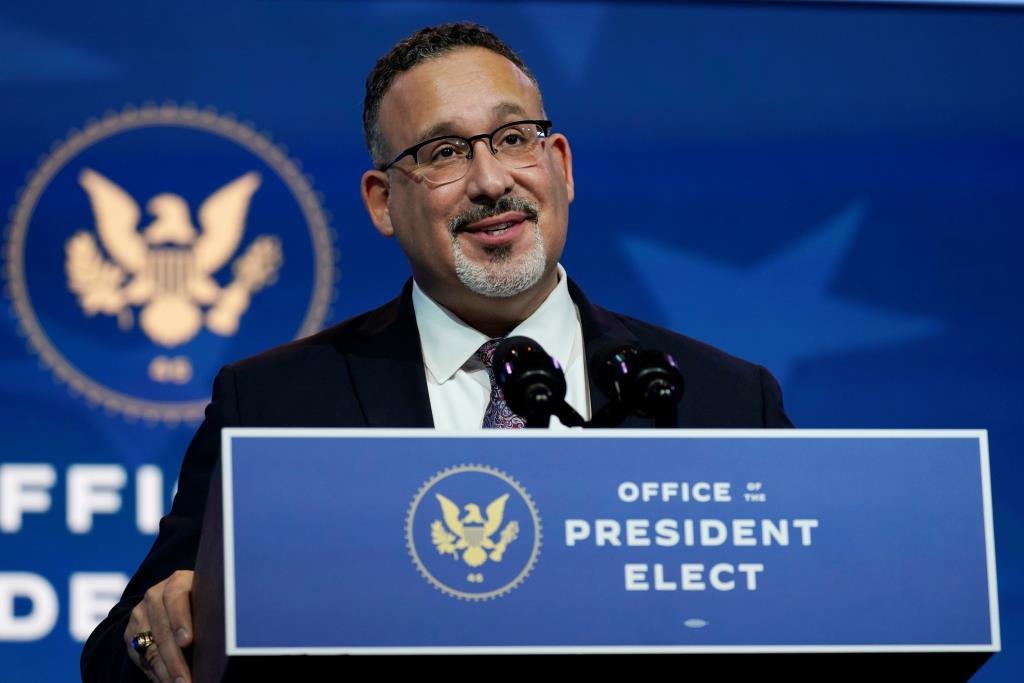 In late December, then President-Elect Joe Biden announced his nominee for U.S. Secretary of Education, Miguel Cardona, currently the Education Commissioner for Connecticut. This prompted me to do a little investigating about this particular cabinet position and what I found was interesting. Here are 5 things I didn’t know:
In late December, then President-Elect Joe Biden announced his nominee for U.S. Secretary of Education, Miguel Cardona, currently the Education Commissioner for Connecticut. This prompted me to do a little investigating about this particular cabinet position and what I found was interesting. Here are 5 things I didn’t know:
- The Department of Education and its Secretary have only been cabinet-level positions since 1980. Before that it it operated within the Department of the Interior and the Department of Health, Education, and Welfare. As cabinet positions go, it’s a mere baby.
- The Secretary of Education is 15th in line for the presidency.
- The Department of Education operates the Office for Civil Rights, which protects students from discrimination or harassment at school. This office also investigates Title IX violations (mainly gender discrimination) and sexual assault allegations on college campuses.
- The Department of Ed also administers Title I funding to schools which is primarily grant monies for low-income schools, Head Start, and the School Lunch program. About 56,000 schools receive Title I funds, reaching about 26 million students. As large as that sounds, schools only get about 8% of their funding from federal sources, most of it in the form of Free/Reduced Lunch.
- The Department of Education plays a major role in subsidizing higher education and determining loan forgiveness. In 2020, it distributed about $31.7 billion in financial aid plus an additional $77 billion in direct student loans.
Without being overly political, Mr. Cardona is a ground-breaking choice for this position. Some unique qualifications (in no particular order):
- He is a former teacher. This feels like a “duh” requirement, but it should be noted that of the last 11 secretaries, only 3 have been teachers. Cardona would be the 4th to have actual classroom experience. Cardona taught elementary school, and has also served as a principal and assistant superintendent in the public schools. He understands education from the ground up. Does one have to have been a teacher to lead this department? I think the better your understanding of something, the more likely you are to make good decisions.
- He is Latino, grew up speaking Spanish, lived in public housing as a child, and is the son of immigrants. He has lived the challenges that many of our most marginalized students face and is uniquely suited to advocate for equity in the public schools. In a country struggling with racial and economic disparities, a secretary who understands the problem from within is invaluable. White people have made a lot of decisions over the years that negatively affected marginalized students. Providing representation for people of color is absolutely necessary as we seek to be as inclusive as we can.
- He has publicly stated that the importance of teachers cannot be overemphasized. Again, this might seem like another “duh” requirement, but until the pandemic, teachers haven’t been valued in the U.S. as they are in other countries (and they still aren’t in financial terms). Whether this will lead to tangible support remains to be seen, but it is hopeful. He certainly represents a sea change from both of the previous administrations’ secretaries and is on record as saying that a teacher’s ability can’t be boiled down to a standardized test score (and I would add, neither can a student’s).
Cardona, assuming he is confirmed, is positioned to have tremendous impact on funding for higher education and on student loan forgiveness. One of the tenets we support at CMSi is the need for school districts to plan K-16 rather than just K-12: the goal should be higher ed for all students. Funding that education is a critical part of realizing that goal. He is also positioned to dramatically alter the proportion of student loan forgiveness, which fell to just 1% of all applications under the last administration, and to play a major role in realizing President Biden’s goal of free community college for all and free tuition at public universities and colleges for those with family incomes under $125,000.
No one person can solve everything, and the role of the U.S. Secretary of Education is actually fairly constrained, but Cardona represents a hopeful shift in focus and understanding for education as a whole. Let’s hope that translates into meaningful progress and support for students and educators everywhere.
